Drone Laws in Georgia

Understanding and respecting the rules, regulations, and any existing laws in the state of Georgia that have been put in place for drone use is very important as a user. Because the popularity of drones, both residential and commercial, have risen quickly over the years, each state has made steps to ensure everyone is safe.
More Resources
This article will give a brief overview of the laws in your state, but we can’t keep cover all the minutae in only two thousand words. That’s why we highly recommend that you do some research on your own time and, ideally, enroll in a professional course if you’re actually looking to get certified. Though there’s lots of options for learning more about drone laws, we highly recommend the#1 Rated Professional Course: Drone Pilot Ground School. Get $50 Off as a Dronethusiast reader, just click the link and sign up. It’s a great way to learn about drone laws and piloting that’s cheaper than most of its competition, you can purchase it once and own it forever and they’re constantly updating their professional training.
All that said, let’s move on to the important stuff.
Flying Over Georgia
Georgia has some amazing areas to fly over, catch footage of, and just enjoy in general. The Blood Mountain is one of Georgia’s highest peaks and is located close enough to the Appalachian Trail that you can get two incredible shots at once. The forests during autumn are one of the best aesthetics that Blood Mountain and the nearby Appalachian Trail has to offer.
Freedom Park in Atlanta is one of the largest in the city and has a cross shape that provides tons of room to fly a drone. There are plenty of areas within the park that are great for photography and videography. The Jimmy Carter Library, for example, is a very interestingly pleasing building to view up close with a drone’s camera.
Panola Mountain is nearly 1000 feet in the air with a combination of the mountain and the State Park. Panola Mountain and the State Park, Panola Mountain State Park specifically, is a perfect spot for hiking and flying a drone.

The Registering Process in Georgia
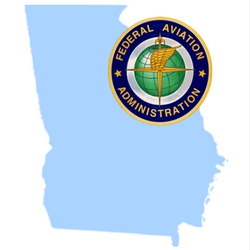
The Federal Aviation Administration (FAA) requires that all Small Unmanned Aircraft Systems (UAS) owners follow strict regulations and laws. You will need to file your name, home address and your email address as a start.
From there, you will receive a Certificate of Aircraft Registration and Proof of Ownership. These will include an identification number for your aircraft. You must have this number displayed on your drone at all times. The number will be valid for up to 3 years.
All aircraft that weighs more than 0.55 pounds, or 250 grams, and less than 55 pounds, or 25 kilograms, must be registered. This also includes any added payloads, such as an onboard camera.
You must be at least 13-years-old in order to register and, effective December 21st, 2015, all newly purchased or made drones must be registered before their first flight. You are able to register through a paper-based process, but you can also do so online by clicking here.
Proximity to Airports in Georgia
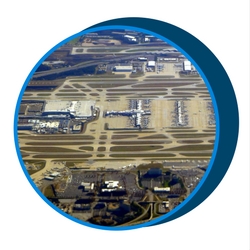
As a general rule of thumb, and in accordance with the law from the FAA, you may not fly within a 5-mile radius of any airport. In 2012 the FAA enacted the Modernization and Reauthorization Act which requires hobbyist drone operators, meaning residential, to contact air traffic control and/or airport management if they are operating within a 5-mile radius of any local airport.
This is enacted nationwide, not only in Georgia, under Part 101 of the Act, being Special Rule for Model Aircraft, to ensure that drone operations under unsafe conditions are disapproved before the drone can be launched.
Regardless of the local airport you will be flying near, and possibly breaching airspace, you will need to contact either the airport air traffic control tower or the airport operator.
You will need to establish an agreed-upon operating procedure with airport air traffic or the airport operator and answer a couple of questions. For example, questions relating to how long you are going to be flying for.
Unique Drone Laws in Georgia
There are no laws in Georgia on drones specifically. However, there are certain bylaws and rules set in place for the purpose of restricting certain areas of drone use to ensure that the public, and the users alike, are safe during any operation.
The Georgia House passed a resolution (HR 744) to create a committee to look into drones. The committee issued their report on December 1, 2015. The report listed out specifically 15 recommendations. While not law, it gives us a “flavor” as to what the Georgia House is thinking.
1. Continue to monitor FAA Regulations with regards to registration requirements of hobbyist operators. The committee does not want to duplicate the process or hinder the industry.
Form a commission made up of legislators, researchers, industry experts, and others deemed appropriate to help develop policy and encourage industry expansion within the state.
Continue to encourage our universities and technical colleges to find ways to get involved by offering classes, certifications, or any other opportunities that may be deemed necessary.
Encourage the state and its agencies to use drone technology in areas where it could provide a cost savings or improve safety.
Look for opportunities to encourage venture capitalists to help with startups in Georgia.
Protect citizen privacy by making it unlawful to video or photograph another person’s property without permission with limited exceptions to this.
7. Prohibit weaponizing a drone.
Make it a violation to fly in or around certain locations such as the capitol.
Allow local governments to restrict the use of drones on their publically owned land.
Make it unlawful to fly around or to interfere with an emergency scene or to interfere with public safety personnel carrying out official duties.
Require law enforcement to have a search warrant to use drones in areas to collect evidence where someone has a reasonable expectation of privacy.
Require any videos or photos taken of private property by a government entity without evidentiary value to a specific case to be purged.
Make it unlawful to take off from or to recover a drone from private or public property without permission.
Prohibit use of drones for hunting and fishing or to use a drone to interfere with someone else that is hunting, fishing, or trapping.
Prohibit the use of drones within so many feet of a public road without permission.
The Governor of Georgia issued on November 2nd, 2016 an executive order “That a Commission on Unmanned Aircraft Technology appointed by the Governor is hereby created to make state-level recommendations to the Governor consistent with current FAA regulations as well as the State’s business and public safety interests.”
The Governor appointed to the commission:
• David Vigilante, Legal Senior Vice President, CNN
• Christopher Davidson, State Archivist/Assistant Vice Chancellor, Georgia Archives, Board of Regents of the University System of Georgia
• Jacob Hinton, Partner, Flyover Services LLC • Lewis Massey, Partner, Massey, Watson & Hembree LLC
• Michael Wall, VP of Government and Regulatory Affairs, Comcast (Georgia)
Other Legal Issues With Drones in Georgia
While there are no effectively set laws except for unlawful circumstances and set legislation by the state, there is, however, a bill that is coming into effect on July the 1st of this year, being 2017.
House Bill 481 (AS PASSED HOUSE AND SENATE)
By: Representatives Tanner of the 9th, Golick of the 40th, Rynders of the 152nd, and Epps of the 144th
A BILL TO BE ENTITLED
AN ACT
To amend Chapter 1 of Title 6 of the Official Code of Georgia Annotated, relating to general provisions regarding aviation, so as to provide for preemption for unmanned aircraft systems; to define a term; to provide for related matters; to repeal conflicting laws; and for other purposes.
BE IT ENACTED BY THE GENERAL ASSEMBLY OF GEORGIA:
SECTION 1.
Chapter 1 of Title 6 of the Official Code of Georgia Annotated, relating to general provisions 8 regarding aviation, is amended by adding a new Code section to read as follows:
9 “6-1-4.
(1) As used in this Code section, the term ‘unmanned aircraft system’ means a powered, aerial vehicle that:
Does not carry a human operator and is operated without the possibility of direct human intervention from within or on the aircraft;
(B) Uses aerodynamic forces to provide vehicle lift;
(C) Can fly autonomously or be piloted remotely; and
(D) Can be expendable or recoverable.
Such term shall not include a satellite.
(b) Any ordinance, resolution, regulation, or policy of any county, municipality, or other political subdivision of this state regulating the testing or operation of unmanned aircraft systems shall be deemed preempted and shall be null, void, and of no force and effect; provided, however, that a county, municipality, or other political subdivision of this state may:
Enforce any ordinance that was adopted on or before April 1, 2017;
Adopt an ordinance that enforces Federal Aviation Administration restrictions; or
Adopt an ordinance that provides for or prohibits the launch or intentional landing of an unmanned aircraft system from or on its public property except with respect to the operation of an unmanned aircraft system for commercial purposes.
(c) The state, through agency or departmental rules and regulations, may provide for or prohibit the launch or intentional landing of an unmanned aircraft system from or on its public property.”
SECTION 2.
All laws and parts of laws in conflict with this Act are repealed.
While this may not be in effect at this time of writing but is a bill that was proposed and passed, it is currently in this category of legal issues with drones and not specific drone laws in Georgia because it has not come into effect yet.
Once it has come into effect these sections will more than likely be updated to reflect drone laws and general legal issues that drone users face in the state of Georgia.
FAQ on Georgia Rules and Drones
If you do not see your question, or an answer to it, listed below, feel free to get in touch with us and we’ll gladly give you one.
Is a drone/UAS considered the same as a model aircraft?
The United States Congress has defined and concluded that a model aircraft is only considered a drone or a UAS when the following points are met:
It’s flown for recreational purposes or as a hobby and not for any business or commercial reasons
It’s flown within visible distance, meaning being able to see it at all times, of the individual operating it
It’s capable of sustaining flight within the atmosphere, meaning that it can fly
If your model aircraft, regardless of whether or not you acquired it pre-built or built it yourself, meets the above points to your knowledge, it’s considered a drone/UAS.
What is the Small UAS Rule?
The Small UAS Rule requires those who have unmanned aircraft systems, or UAS, that weigh less than 55 pounds, payload included, to register their aircraft with the FAA. This only applies to recreational or hobby fliers and not commercial drone use, however.
Is the FAA’s Small UAS Rule still in effect?
Yes, it has been in effect from August 29th of 2016 and is still in effect at this time of writing.
Do I have to carry my Certificate of Aircraft Registration while flying my UAS at all times?
Yes, you must have the registration certificate from the FAA at all times during flight operation. In accordance with federal law, all UAS operators must show their certificate of registration to any local, state, or federal law enforcement officer when they are asked to do so.
What do I do for registration if my UAS is over the 55-pound limit?
If your UAS weighs more than 55 pounds, including payload, you will need to register it by clicking here.
How do I request flight permission from Air Traffic Control to operate within airspace class B, C, D, or E?
You can contact Air Traffic Control for flight permission through the FAA portal available online by clicking here.

Drone Laws in Georgia
The best way to avoid issues when flying a drone, not just in Georgia but nationwide, is to do your research and abide by the laws, regulations, and rules that go with flying a drone in your state.

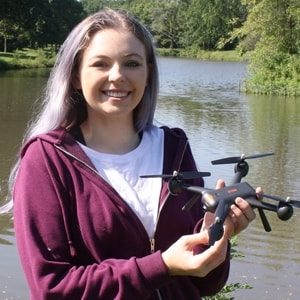


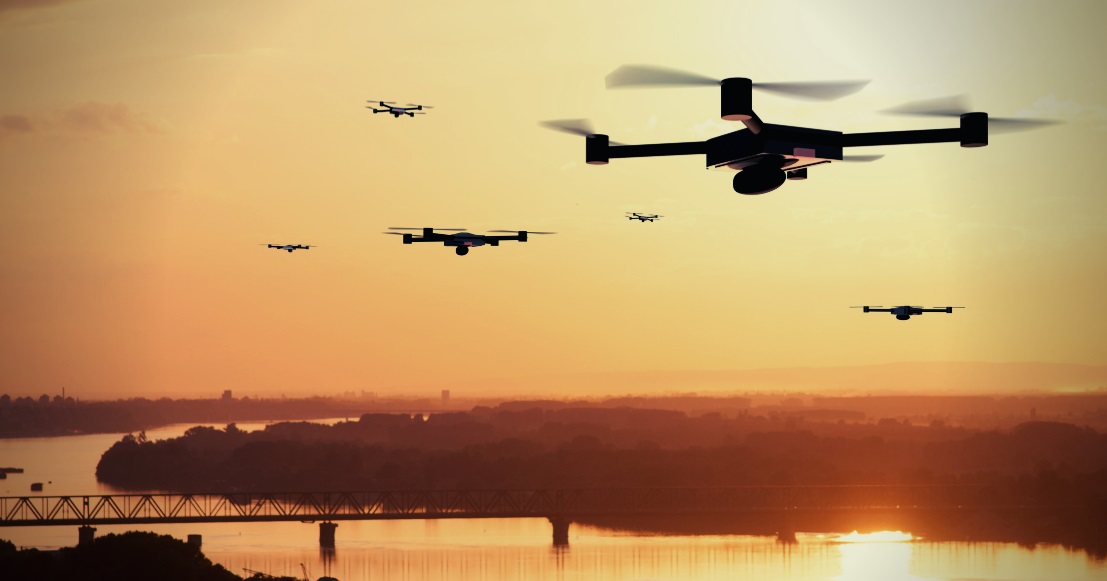
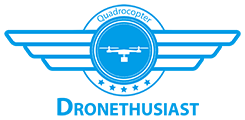
This article mentions Blood Mountain and the Appalachian Trail — the Appalachian Trail (Appalachian National Scenic Trail) is managed by the National Park Service, which has restrictions regarding drones: https://www.nps.gov/articles/unmanned-aircraft-in-the-national-parks.htm
The Chattahoochee National Forest (host of Blood Mountain Wilderness) is regulated by the USFS thus would have different regulations than the NPS.
My neighbor is flying his drone over my property and home and hovering the drone there maybe 30 feet in the air for a good amount of time.
Is that legal in the state Georgia. What are my rights as home and land owner.
Is it legal to shoot it down.
Courts have generally held that at least 83′ and below is ‘your’ space (see *below). So, flying an aerial camera within that space could be considered electronic voyeurism — a felony in Georgia. You might let him know that. Re: shooting it down, then YOU would be guilty of a felony at the federal level, since the FAA views shooting at a drone the same as shooting at ANY federally-registered aircraft, manned or not. (18 U.S.C. 32 is the law that, in part, says “United States jurisdiction over aircraft sabotage to include destruction of any aircraft in the special aircraft jurisdiction of the United States.” — from an FAA-certified drone pilot
*In United States v. Causby, the Supreme Court of the United States in 1946 provided guidance on where private property rights of airspace end and navigable airspace begins. In Causby, a farmer lived adjacent to a military airport where aircraft flew as low as 83 feet over the farmer’s property. As a result, the noise from the aircraft startled the farmer’s chickens, causing them to kill themselves by flying into walls.
Since the navigable airspace which Congress had placed in the public domain was airspace above what was deemed the minimum safe altitude (“MSA”), the Supreme Court reasoned that airspace above the MSA was immune from suits against the government for a takings violation.
The Causby Court put forth two key principles regarding airspace below the MSA. First, landowners have “exclusive control of the immediate reaches of the enveloping atmosphere.” Second, landowners own at least as much of the space above the ground as they can occupy or use in connection with the land.
While it appears that the lowest “navigable airspace” could descend to is just over the Causby limits, the circumstances of the case may limit its applicability. Causby took place during World War II. It involved large military aircraft flying 83 feet above the farmer’s property. The unsettling noise resulted in the destruction of the use of the property as a commercial chicken farm and caused the farmer’s family severe anxiety from the lack of sleep. In contrast, drones are typically not noisy or earsplitting, and often fly well below 83 feet. Further, drone technology did not exist when Causby was decided 70 years ago.
The Court ruled in favor of the farmer. However, several questions linger including “where the precise boundaries of public airspace above the farm meet the immediate reaches of the farmer’s property” and how high state government’s rights extend.
Negative you stated your neighbor. Maybe they were hovering over the property line i would talk with them personally first letting them know it makes you uncomfortable before taking further action.
I just bought a drone near conyers ga and was wondering is it even worth having since I am an rc hobbyist and love cars and truggies but never had a drone before? I mean will I get in trouble flying around my house or in a park? Just not sure where I can fly the drone when I do get it because of all the laws saying where you cant fly?
I’m former FAA and assisted the 1989 AMA waiver for RC aircraft ops. I’m also a helicopter pilot in GA. The videos this guy took concern me as he is clearly flying over 400 ft AGL. I know this because I fly over these areas at 500 ft AGL all the time. Even more disturbing is he is within 5 miles of airports and flying at reporting points for arrival aircraft. What this guy did is clearly illegal now, don’t do it.
I guess it all depends. As they say with government regulations “There’s a waiver for everything” so exceeding the 400 ft AGL rule is possible if you contact the FAA, get permits and NOTAMS issued for certain flight activities. He’s also operating that sUAS at night (past the end of evening civil twilight and before the start of morning civil twilight), which is also illegal without special flight permits to do so.
Capt Rick. I have a question for you. I live intown in the City of Atlanta. For the last approx. 2 years there has been a constant flow of helicopter traffic flying, at high speed, a corridor north-west to south-east and south east to north-west, day and night at levels that are so low I can feel the vibration in my body while I am in my house. I have been told by the flight standards office that I need to give them tail numbers. The only way to get the tail numbers that I can determine is with a drone. Suggestions?
Can an HOA restrict use of drones over the community’s private lake that is home to ducks and geese?
I am registered with the FAA Part 107 and I am starting to fly a drone for my company. I recently saw that I have to take a test at a site in Jefferson County Georgia (I’m assuming because of GDOT). Where can I get more information on this?
A similar question to another posted. A drone has been hovering over my deck for several evenings in a row. I heard the buzzing noise at times, so it was close. I live in a densely populated neighborhood in Atlanta where houses are close together. Our neighborhood is also within 5 miles of Charley Brown airport. Would like to talk to this neighbor in a friendly way, but am concerned about his voyeuristic tendencies. Not sure what else he is capable of.
What agency would be a good source to discuss this with.
how late can i fly my drone
Why are several drones flying over the city of Buford Ga. every night.
I was just contacted by the HOA president saying there has been complaint(s) about my drone flying above homes.
When i take off from my home i go straight up at least 200ft (60.96m). There is hardly any sound and images are so small from that high. But i guess some people live to complain about anything.
I understand it is not legal to use a drone to fish. Is it illegal to use the drone to drop a fishing line into the water not to actually have it retrieve fish?